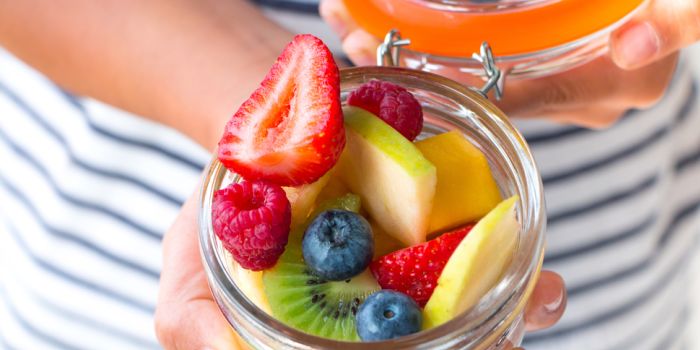Healthy home working snacks
For many of us, home working has become the new normal. You might not be surrounded by office treats but working from home can make it difficult to resist the snack cupboard. It’s normal to turn to food as a source of comfort during a stressful day. But snacking more often or eating too many highly processed foods could be harmful to your health.
Here, I’ll share some simple tools and behavioral science techniques to help you snack well at home.

Think about why you’re snacking
There are lots of different reasons you might be snacking more when you work from home. So, becoming aware of what’s triggering your eating is a good place to start. This can help you to change your habits and behaviours. I’ve listed some possible reasons below.
Stress
Stress can be a trigger for overeating. In the short term, your hunger levels go down when you’re stressed. But if you’re stressed over the longer term, your body will begin to produce hormones that increase your appetite. Studies have shown that you’re more likely to reach for sugary treats when you’re stressed because they provide comfort.
Boredom
Research has also found that the discomfort you feel when you’re bored can lead you to choose unhealthy snacks between meals. What’s more, eating activates the reward and pleasure centres in your brain – leading you to reach for more work from home snacks, even when you’re not actually hungry.
Tiredness
If you’re having trouble sleeping, then feeling tired can lead you to consume more snacks than if you are well rested. And you can end up choosing less healthy foods too. For example, one study looked at the eating behaviours of shift workers. It found that when their sleep was severely interrupted, they were more likely to reach for high-fat and sugary snacks during the day.
Feeling sad or lonely
If you’re feeling sad or lonely you might not feel like cooking and instead turn to snacks, convenience foods, or takeaways. These foods often lack the nutrients your body needs to stay healthy. But eating a healthy, balanced meal can help to improve your mood, reduce irritability, and increase positive emotions.
Being busy
Working from home can often involve juggling housework, childcare, and other demands. Cooking might be low down on your list of priorities. But skipping a meal when you’re short of time can cause your blood sugar and energy levels to drop. As a result, you might find yourself grabbing snacks for a quick fix or grazing throughout the day instead. One way to combat this is by eating a healthy breakfast.
One study showed that people who regularly ate breakfast, were less likely to overeat throughout the rest of the day. They also slept better, had improved mood, and felt more alert.
Habit
Habits are the things you do automatically without realizing it. They’re usually triggered by a certain context or situation. The more often you do these things, the more your brain learns to do them ‘habitually’ without too much thought. Before long, your behaviour becomes triggered by cues in your environment, rather than because you actually need to do something.
For example, you might reach for a biscuit at 11am, or pour a glass of wine when you log off from work.
Once you’re aware of what’s causing you to eat more, try the ideas below to help change your behaviours and habits.
Create an action plan
Having a plan of action ready for when you feel tempted to snack on unhealthy foods can be the key to success. A great way to do this is by making an ‘if/then’ plan.
An ‘if/then’ plan can help you identify what triggers you to eat unhealthy foods. You can then plan ahead for what you will do when it happens. For example:
- ‘if I feel myself getting stressed during the day, then I will go outside for my daily exercise’
- ‘if I feel anxious or overwhelmed, then I will take five deep breaths’
- ‘if I’m feeling lonely, then I’ll video call a friend for a chat’
Why not create an ‘if-then’ plan to help you reconnect with something you love doing, or to discover something new? For example, ‘if I’m bored, I will mix up my normal exercise routine by trying a new workout online.’
Design your environment
Try these tips to make your surroundings work for you.
- Schedule some time at the weekend to make a meal plan and go shopping for the coming week. Buying only the ingredients for the meals you’ve planned will ensure you have a stock of healthy snacks and meals to hand. And, can help to reduce the temptation to order in takeaway meals.
- If you do have treats in the house, put them out of sight and easy reach in cupboards – up high on shelves or in a container is ideal. Making it more effort to access them gives your brain chance to weigh up whether you really want them.
- Keep a bottle of water close by and sip throughout the day. Thirst can sometimes feel like hunger, prompting you to reach for snacks when your body doesn’t really need them.
Adopt a healthy mealtime routine
Create new, healthy habits and behaviours around mealtimes.
- Keep to a regular mealtime routine to ensure you don’t get too hungry between meals or overdo your portion sizes.
- Avoid multitasking when food is around. Switch off distractions such as the TV and your phone and take a moment to pause and enjoy the textures and flavours. You’ll not only be more aware of what you’re eating but also whether you feel full after eating.
- Make mealtimes an event and something to look forward to. Take the time to try out a new recipe or even a new cuisine. You could try cooking food from different countries once a week to mix things up.
Easy, healthy home working snack ideas
- If you do snack, try and make it healthy. Why not try chopped raw vegetables with a low-fat dip, air-popped popcorn, fresh fruit, or a handful of unsalted nuts.
- Keep a plate of healthy snacks prepared in your kitchen or fridge so they’re just as easy to grab as a bag of crisps or biscuit.
Do you know how healthy you truly are? Bupa health assessments give you a clear overview of your health and a view of any future health risks. You'll receive a personal lifestyle action plan with health goals to reach for a happier, healthier you.
-
Sources Sources
- Zellner DA, Loaiza S, Gonzalez Z et al. Food selection changes under stress. Physiol Behav. 2006 (87); 789–793
- Moynihan AB, Van Tilburg WA, Igou ER et al. (2015). Eaten up by boredom: consuming food to escape awareness of the bored self. Frontiers in psychology. 2015 (6); 369. doi.org/10.3389/fpsyg.2015.00369
- Gwin JA & Leidy HJ. Breakfast consumption augments appetite, eating behavior, and exploratory markers of sleep quality compared with skipping breakfast in healthy young adults, Current Developments in Nutrition.2018; (2)11
- Ogden J, Coop N, Cousins C et al. Distraction, the desire to eat and food intake. Towards an expanded model of mindless eating. Appetite. 2013 (62) 119-126
- Heath G, et al. The effect of sleep restriction on snacking behaviour during a week of simulated shiftwork. Accident Analysis & Prevention. 2012 (45): 62-67
- Hanna KL & Collins PF. Relationship between living alone and food and nutrient intake. Nutrition Reviews. 2015; 73(9): 594 DOI: 10.1093/nutrit/nuv024
- Gibson EL. Emotion influences on food choice: sensory, physiological and psychological pathways. Physiology and Behaviour. 2006; 89(1), 53-61
- Healthy snacking. British Nutrition Foundation. www.nutrition.org.uk, accessed 28 June 2023. April 2020
- Food and mood. The Association of UK Dietitians. www.bda.uk.com, accessed 28 June 2023
- Eating well during coronavirus/COVID-19. The Association of UK Dietitians. www.bda.uk.com, published 7 April 2020
- Healthy snacks. The Association of UK Dietitians. www.bda.uk.com, accessed 28 June 2023
- Sominsky L and Spencer S. Eating behaviour and stress: a pathway to obesity. Front Psychol 2014; 13(5):434. doi: 10.3389/fpsyg.2014.00434
- Cohen D, Farley TA. Eating as an Automatic Behaviour. Prev Chronic Dis. 2008 Jan; 5(1): A23
- Robinson E et al. Eating attentively: a systematic review and meta-analysis of the effect of food intake memory and awareness on eating. Am J Clin Nutr. 2013 Apr;97(4):728-42
- Adriaanse MA, Vinkers C, De Ridder D, et al. Do implementation intentions help to eat a healthy diet? A systematic review and meta-analysis of the empirical evidence. Appetite 2011; 56(1):183-93. doi:10.1016/j.appet.2010.10.012
- Terry ML, Leary MR. Self-compassion, self-regulation, and health. Self Identity 2011; 10(3):352–62. doi:10.1080/15298868.2011.558404
- Singh M. Mood, food and obesity. Front Psychol. 2014; 5: 925
About our health information
At Bupa we produce a wealth of free health information for you and your family. This is because we believe that trustworthy information is essential in helping you make better decisions about your health and wellbeing.
Our information has been awarded the PIF TICK for trustworthy health information. It also follows the principles of the The Information Standard.

More diet and nutrition articles
Did you find our advice helpful?
We’d love to hear what you think. Our short survey takes just a few minutes to complete and helps us to keep improving our healthy lifestyle articles.
Legal disclaimer
This information was published by Bupa's Health Content Team and is based on reputable sources of medical evidence. It has been reviewed by appropriate medical or clinical professionals and deemed accurate on the date of review. Photos are only for illustrative purposes and do not reflect every presentation of a condition.
Any information about a treatment or procedure is generic, and does not necessarily describe that treatment or procedure as delivered by Bupa or its associated providers.
The information contained on this page and in any third party websites referred to on this page is not intended nor implied to be a substitute for professional medical advice nor is it intended to be for medical diagnosis or treatment. Third party websites are not owned or controlled by Bupa and any individual may be able to access and post messages on them. Bupa is not responsible for the content or availability of these third party websites. We do not accept advertising on this page.







